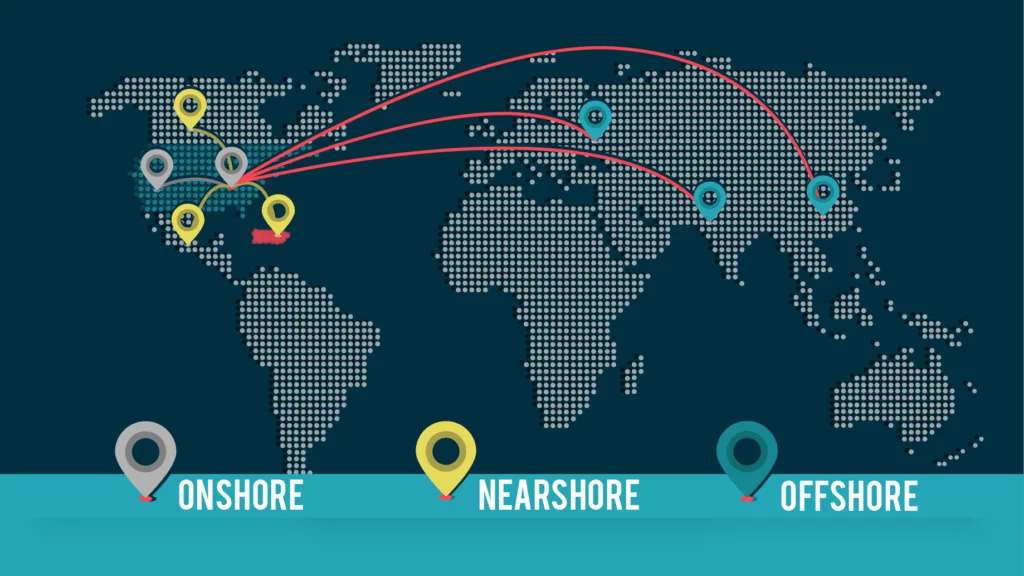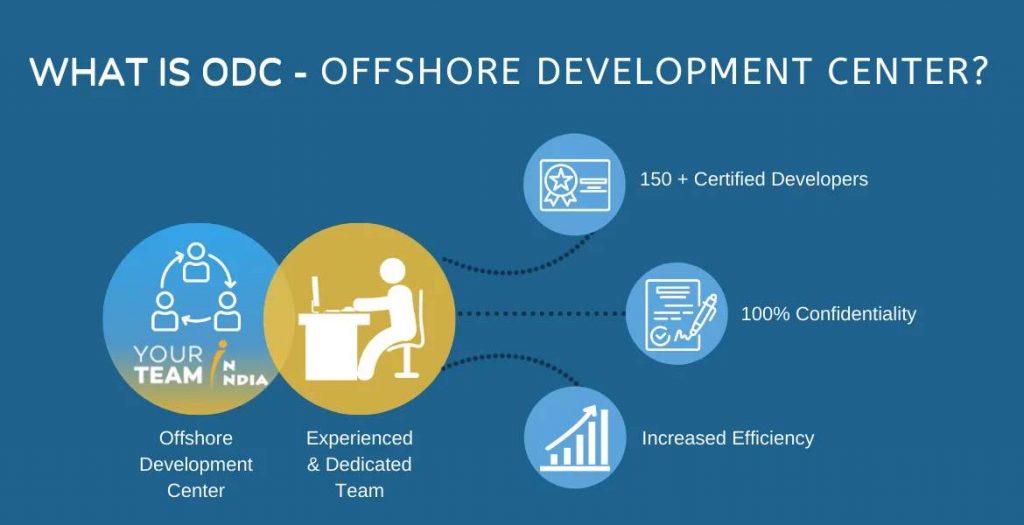
Quick Summary:
Outsourcing vs Offshore Development Center - In this article, we will explore the differences between traditional outsourcing and offshore development center (ODC) models. We will examine the benefits and drawbacks of each approach and help you determine which option is best for your business.
Demand for specialists is extending nationwide. Probably that’s why companies are reconsidering their hiring strategies and not shying away from outsourcing specialists for giving a competitive edge to their business.
However, there is constant confusion between two terms in this market - Traditional outsourcing vs offshore development center (as to which is better and why).
Although both these terms are not novel to businesses, most of us don’t even have a crystal clear apprehension of both these terms.
Simply put, the main difference between outsourcing and offshore development is that traditional Outsourcing involves collaborating with a third party to handle data, while Offshore Development Center (ODC) establishes a remote IT team to extend on-premises teams. ODC is suitable for startups and large organizations.
In this article, you will learn about these terms, how they are essential for your business, and which one is better for the ultimate growth of your business.
Key Listing
- Traditional outsourcing and Offshore Development Center (ODC) are two different business models that offer unique benefits and drawbacks depending on the needs of your business.
- Traditional outsourcing involves collaborating with a third-party to handle data, while ODC establishes a remote IT team to extend on-premises teams.
- ODC can be more cost-effective in the long run, making it a suitable option for startups and large organizations looking to establish a dedicated remote team for ongoing development and maintenance.
- Both traditional outsourcing and ODC can be suitable for large organizations, depending on their specific needs. It's important to evaluate the benefits and drawbacks of each approach and determine which option is best for your business.
What is Traditional Outsourcing?
It is a business practice where services are farmed out to a third party. A third party takes care of specific tasks, operations, or services for the company that wants the services. Their responsibilities include arranging their systems to work, completing tasks in a given time, and delivering quality results as expected by the company wanting services.
According to Wikipedia: Outsourcing refers to a contract where a company engages another company to manage a specific project or task that could be handled internally, within the organization. This may involve the relocation of resources and staff from one company to the other.
Software Development Outsourcing is no longer limited to cost savings - it has evolved as a strategic tool to capitalize on the world’s evolution into a better tech-savvy place.
The outsourcing market has evolved, exploded, and there are no signs of slowing down. This crazy boom has been so lucrative for the companies, who have genuinely leveraged the potential of outsourcing.
Outsourcing has led these companies to:
- Strengthen focus on core business activities
- Improved efficiencies in the organizational processes
- Minimum time to market
- Cost Containment
- Extraordinary Quality
Outsourcing has the potential to bring excellent benefits to your business. However, there are specific challenges that come along with this process.
Let’s explore it as we break down all about traditional outsourcing that you need to know.
- Generally outsourced services are:
- Operational Outsourcing
- Professional Outsourcing
- Process Outsourcing
- IT Outsourcing
- Project Outsourcing
- Manufacturing Outsourcing
Outsourcing is also known as contracting out or business process outsourcing.
Why Do Companies Outsource?
Every company that is outsourcing has its reasons to do so. We are mentioning some primary ones that almost every company lures for from outsourcing.

1. For Enhanced Business Efficiency
No matter what sort of outsourcing your company is doing, it must bring in the potential to improve the efficiency of the business. No company would expect the process to drag out longer, consuming more valuable employee time.
2. For Experiencing Complete Availablity
Remote teams in India or the Philippines are amongst the best bet to get affordable units for high-quality work deliveries. However, it doesn’t have to be outside your country always. You can outsource your team from your own country. In the end, their availability matters, not where you are hiring them from.
3. For Enjoying High-Quality Work
The possibility of your outsourced team already having tons of clients with a load of work is higher. So, we recommend you check the quality of work delivered regularly (once they are outsourced).
4. For Linking Directly to the Bottom Line
An outsourced company should be able to deliver the quality of work that grows your business. Make sure the services boost the sales and profits of your business. After all, that’s one of the primary reasons for most companies.
5. For Fulfilling Constant Work Delivery
The chances of getting constant work delivery from the outsourced team are more than your existing (in-house) team, as the continuous challenges of your team are mostly shifting on a daily basis.
Types of Outsourcing
Outsourcing can be divided into three major categories:

1. Onshore outsourcing
This typically involves sending tasks to a company located in the same country or a region nearby. Some commonly experienced benefits of this outsourcing are:
- Easy to control
- Easily accessible
- Speak the same language
- Shares the same timezone
2. Nearshore Outsourcing
When your company hires companies in countries with the same time zones is known as nearshore outsourcing. The benefits of this outsourcing type are:
- No timezone difference
- Higher effectiveness
- Similarities in culture/language
- Cost-saving
3. Offshore Outsourcing
The outsourced party belongs to some other country to performs the business tasks assigned. Usually, the focus of Offshore Outsourcing is to attain the most cost-effective services for the business.
Advantages of Outsourcing
As we mentioned, there are different reasons why outsourcing is opted for by companies. Here are some recognized benefits of outsourcing:
- Enhanced Focus on Business Activities
The primary objective of outsourcing is to focus on core business activities. Outsourcing a team can give you sufficient time to focus on building your business, focus on the strengths, and allow enough time for your team member to concentrate on core business activities.
- Higher Efficiency
Outsourcing companies generally specialized in a particular service that you have hired them for. Hence, the work delivered is more effective, quality, and efficient in all terms, as specialized professionals take care of it.
- Improved Reach
Outsourcing helps you get access to those services, abilities, and capabilities that are not otherwise available or affordable.
- Greater Competitive Edge
With this process, you can leverage the skills and knowledge that can help you be more competitive and win the market.
- Limited Cost
You can save a considerable cost by outsourcing a team at an affordable rate. Further, you can invest this saved cost in the core activities of the organization.
Related Read: Why IT Outsourcing in India is the Best Decision
Disadvantages of Outsourcing
Outsourcing brings certain disadvantages to the organization as well. Here are some:
- Service Delivery
Sometimes it may fall behind your expectations. In that case, you must have a backup ready or discuss the same with the outsourcing company as to how you can compensate for the work loss.
- Confidentiality
That goes for companies that don’t indulge in signing NDA. That could be a sign you don’t wish to outsource from such a company.
- Management Constraints
Change in management in the outsourcing company can lead to concerns in terms of quality of work delivery. However, if that is advanced, you can avoid any unwanted situation.
Offshore Development Center
An offshore development center is an extended and offshore team that supports a team situated in some other country. Generally, it is adopted by startups and enterprise companies.
An offshore development center or ODC is utilized for numerous services, including project management, technical support, maintenance of solutions, and migration.

Moreover, ODC is used to offshore the development, design, and testing services for their products and services. Usually, adopting the ODC model is to quicken up these tasks without losing quality and using the specialized skills of the professionals.
Offshore Development Center - Key Roles
When you (as a client) are planning to hire a team using Offshore Development Center, it is essential to coordinate with the provider to seamlessly discuss the business’s requirements.
Here are some critical roles in Offshore Development Center:
- Account Manager
- Project Manager
- Designers & Developers
- Testing Engineers
- Content Writers
Advantages of Offshore Development Center
Offshore Development Center comes with certain advantages and disadvantages, and both should be considered for accurate decision-making for your business.
- Evident Decrease in Infrastructure
There is no need to set up office equipment, IT infrastructure, and other utilities, which means you can save a considerable cost and utilize it to magnify your business activities. You can focus on hiring more team members for higher productivity and efficiency.
- Highly Reliable Operations
Professional ODC companies are quick, reliable, and highly efficient. They have genuine evaluation and reporting procedures to deliver the services asked for by their clients. It is pretty effortless to monitor the progress of any project when you pick a highly experienced ODC company for your projects.
- On-Time Project Delivery
ODC streamlines processes and projects under an optimized environment. The ODC team thoroughly follows the timelines, deadlines, and guidelines to ensure that all projects are delivered on time. They follow planning, designing, development, testing, and deployment to deliver the tasks successfully. Hence, you can quickly receive the expected outcomes in the shortest timeframes.
- Access to Premium Skills
With ODC, you have access to highly efficient professionals who possess essential skills and experience to develop and design as per your expectations. The offshore teams have exceptional expertise and years of experience in delivering the results that you want. Their expertise is backed up by apt training and skills upgrades, which is a good sign for any ODC company.
- Knowledge Retention
ODC has constant technical support available during the complete product lifecycle. They ensure that your targeted customers are satisfied with what they deliver. Their approach to knowledge retention helps them utilize all the skills, training, and expertise in providing the expected results.
Disadvantages of Offshore Development Center
Offshore Development Center brings in some disadvantages too. Here are some of them:
- Collaboration Concerns
There could be a few possible concerns when opting for ODC, including cultural differences, language barriers, time constraints, and miscommunication. However, with proper discussion (meetings, chats, or video calls), you can quickly fix this issue.
- IP Issues
Stealing IP is the most common issue when you are opting for an offshore development center. It is critical to developing a plan to protect your IP, including your code, algorithms, data, or the value of the company. Limit access to the company’s assets and accounts for securing your data and system.
Traditional Outsourcing vs Offshore Development Center: Infographic

Being a business owner, you will need to see which one better complements your business needs. If you are looking for someone to work on a small project, go for outsourcing; otherwise, pick an offshore development center for more extensive and complex projects for successful completion.
Need help setting up a dedicated team of developers in India? Connect with us our business head now and get a free consultation.

Frequently Asked Questions (FAQs)
Which approach is more cost-effective, traditional outsourcing or ODC?
Which approach is more suitable for startups, traditional outsourcing or ODC?
Which approach is more suitable for large organizations, traditional outsourcing or ODC?







